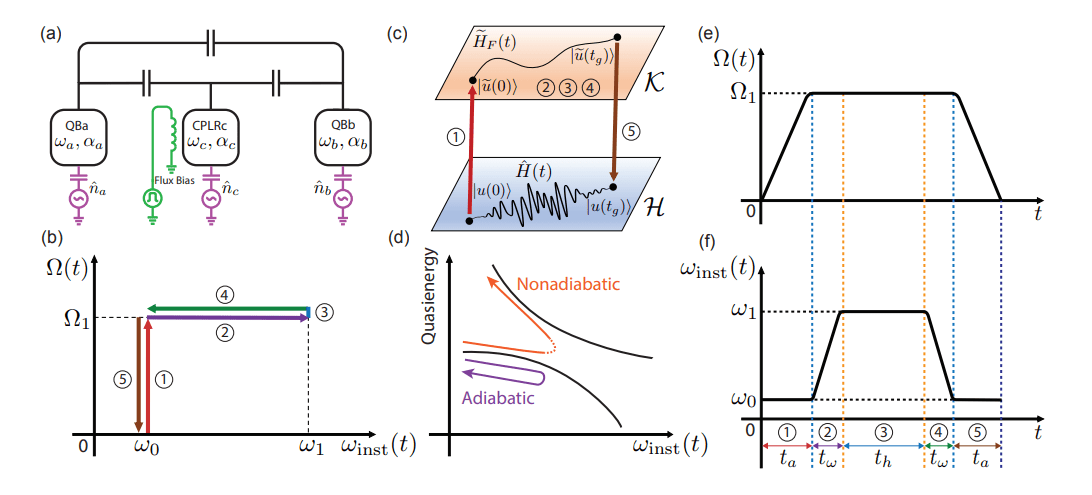Precise control of qubits remains a key challenge in developing practical quantum computers, and researchers are constantly looking for methods to improve the accuracy and speed of quantum operations. Qi Ding, Shoumik Chowdhury of the Massachusetts Institute of Technology, and Agustín Di Paolo of Google Quantum AI, along with Réouven Assouly and Alan V. Oppenheim of MIT, and Jeffrey A. Grover, present a new theoretical framework for implementing quantum gates using frequency and amplitude modulation of microwave control signals. This approach cleverly shifts the need for tuning the qubit frequencies to modulating the driving frequencies, providing a potentially simpler and more robust method for achieving high-precision control. Through detailed simulations, the team demonstrates the ability to create a universal set of quantum gates with exceptionally low error rates and fast operation times, paving the way for more complex and reliable quantum computations.
Achieving high-precision single- and two-qubit gates is crucial for running any digital quantum algorithm and for building error-corrected quantum computers. This research proposes a theoretical framework for the implementation of quantum gates using frequency and amplitude modulated microwave control and extends traditional amplitude modulation by introducing frequency modulation as an additional control parameter. This approach works with fixed frequency qubits, eliminates the need for qubit frequency tunability, and uses Floquet theory to analyze and design these gates, providing a path to improved quantum control.
Superconducting Qubit Control and Optimization Techniques
Recent advances in quantum computing are increasingly focused on sophisticated control techniques for superconducting qubits. At the heart of this field is the development of universal gate sets that enable complex quantum computations, and researchers are actively exploring advanced control techniques, including Floquet technology and adiabatic control, to protect qubits from noise and improve coherence. Theoretical tools such as quantum master equations and numerical simulations play a critical role in modeling qubit dynamics and optimizing control parameters, driving progress toward scalable quantum processors. An important trend is the evolution from static control impulses to dynamic control, in which time-varying drives are used to change the properties of qubits and increase performance. Noise reduction remains paramount and the area continues to evolve. Researchers are exploring new qubit designs and architectures to improve performance and scalability.
Fast, precise quantum control through frequency modulation
Scientists have achieved high-precision control of quantum bits, or qubits, using a novel gate implementation approach based on precisely shaped microwave signals. This work presents a theoretical framework that extends traditional microwave amplitude modulation by incorporating frequency modulation as an additional control parameter, thus enabling operation on fixed frequency qubits. The team demonstrates the ability to design universal quantum gates, including X, Hadamard, phase and CZ gates, with control signals having minimal amplitude fluctuations. Single-qubit operations are achieved in 25 to 40 nanoseconds, while two-qubit operations, including a tailored, always-on CZ gate, are completed in 80 to 135 nanoseconds.
The research uses Floquet theory to analyze and optimize these microwave drives, ensuring broad applicability for various gate types and control schemes. By carefully manipulating both the frequency and amplitude of microwave signals, scientists can precisely control the interactions between qubits, enabling the execution of complex quantum algorithms. Experiments conducted using numerical simulations with realistic transmon qubit parameters confirm the practical applicability of the approach. In addition, the team developed a fast quasiadiabatic method to accelerate adiabatic gate dynamics by shaping the temporal profile of the control parameter, thereby maintaining homogeneous adiabaticity while shortening the overall gate duration. This method dynamically adjusts the control signal to the energy gap between qubit states, speeding up the process without sacrificing accuracy.
Fast, precise gates without frequency tuning
This research presents a new theoretical framework for the design of high-fidelity quantum gates using microwave control and extends conventional methods by incorporating frequency and amplitude modulation. The team shows that this approach enables precise control of qubit operations, accommodates both adiabatic and nonadiabatic gate designs, and, crucially, does not require tunability of the qubit frequency. Numerical simulations using realistic parameters for transmon qubits confirm the feasibility of this framework, achieving a universal gate set, including X, Hadamard, Phase and CZ gates, with control errors consistently below 0.1%.
One-qubit operations have particularly fast gate times, ranging between 25 and 40 nanoseconds, while two-qubit operations achieve times of 80 to 135 nanoseconds. The significance of this work lies in expanding the toolkit for microwave-based quantum control and providing a systematic strategy for optimizing gate design parameters. By going beyond simple amplitude modulation, the researchers enable greater precision and flexibility in manipulating qubits, and the framework is potentially applicable to other qubit modalities, such as fluxonium qubits, neutral atoms, or trapped ions.
